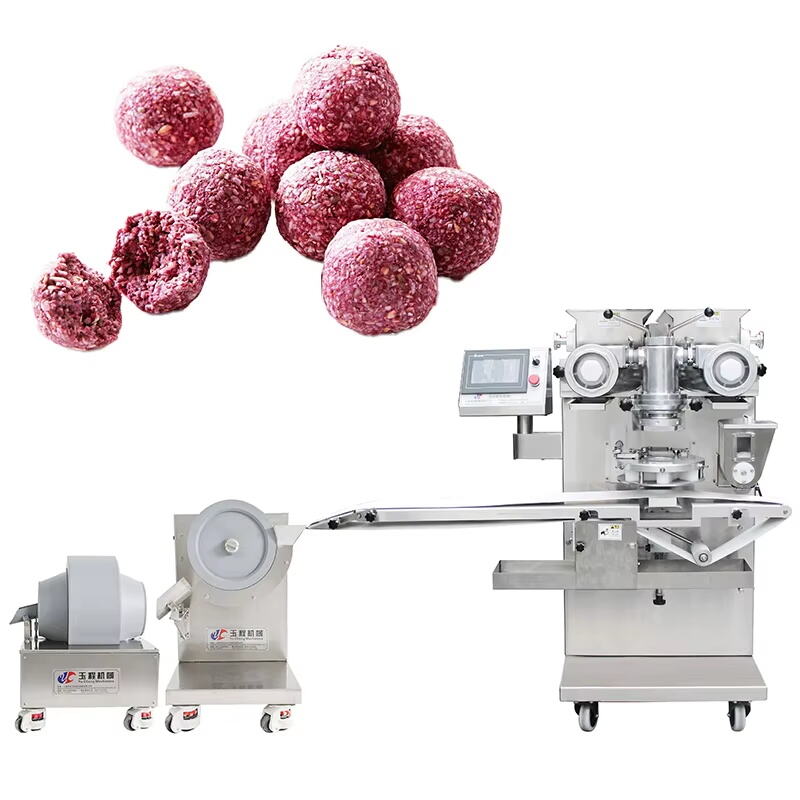Why Regular Maintenance Matters for Energy Ball Machines
Extending Equipment Lifespan
Keeping energy ball machines well maintained really matters when it comes to making them last longer and avoiding unnecessary breakdowns. Most technicians will tell anyone who asks that good regular care can actually stretch out the life of these machines by several years, which protects what businesses spend on them, particularly those running large scale operations. Checking things over regularly makes sense because small problems get caught early before they turn into big repair bills down the road. For companies depending on steady production from their equipment day after day, this kind of forward thinking maintenance just makes business sense. And let's not forget about replacing worn out parts too. Going with decent quality replacements instead of cheap knockoffs during routine service goes a long way toward keeping everything working smoothly together for much longer.
Preventing Bacterial Growth and Contamination
Keeping equipment clean and well maintained plays a big role in cutting down on bacteria growth and contamination risks across food manufacturing settings. Research indicates that when machines stay in good sanitary condition, there tend to be fewer instances of contamination problems, which naturally boosts both product safety and general quality levels. Setting up consistent cleaning routines keeps things hygienic and makes sure businesses meet all necessary health code requirements something every food company really needs to focus on if they want to maintain their standards. When cleaning happens regularly, production lines run better without unexpected breakdowns, while also making sure what comes off those lines stays safe for customers to eat. This attention to cleanliness not only protects people who consume the products but also guards against damage to the brand name over time.
Daily Cleaning Routine for Optimal Performance
Post-Use Cleaning of Hoppers and Conveyors
Keeping energy ball machines clean on a daily basis really matters for their performance down the road. Cleaning those hoppers and conveyors right after each run stops material from building up inside, something that can cause major headaches later during production. When manufacturers take the time to wipe away every last bit of residue, they're actually doing themselves a favor in terms of product quality while cutting down on waste. And let's talk about the stuff used for cleaning too. Food grade equipment needs special brushes and cleaners made specifically for these machines. Getting this right means better sanitation results without wearing down the machinery itself. Proper maintenance like this keeps products safe for consumers and saves money in the long run since the equipment lasts longer before needing replacement.
Wiping Down Molds and Forming Components
Cleaning doesn't just stop at hoppers and conveyors but needs attention on molds and forming parts too. Once production wraps up, workers should take time to wipe these areas thoroughly since leftover material can harden and mess up future runs. Keeping things clean isn't just good practice it actually helps meet food safety standards and cuts down chances of contamination between different products. Training employees properly matters a lot here. When staff know how to clean right, they avoid accidentally harming sensitive parts while still getting rid of all the grime. The goal is simple clean surfaces without breaking them in the process.
Using Food-Safe Sanitizers for Surface Disinfection
Good disinfection is essential for food safety, especially when it comes to cleaning all contact surfaces on energy ball machines using NSF approved food safe sanitizers. When done regularly, this process cuts down on pathogens which matters a lot in food processing areas where product safety cannot be compromised. Keeping track of how much sanitizer gets used each day helps during inspections and makes compliance easier for everyone involved. These records also show management cares about clean operations. Companies that implement these basic but effective cleaning routines not only stay compliant with health codes but actually lower their risk of contamination incidents significantly over time.
Weekly Deep Cleaning Procedures
Disassembling Key Components for Thorough Scrubbing
A good weekly deep clean for Energy Ball Machines means taking apart those critical parts so everything gets properly scrubbed down and checked for cleanliness. Neglecting this step leads to buildup over time, which isn't just unsanitary but actually makes the machines work harder than they should. When mechanics take components apart piece by piece, they spot those hard-to-reach spots behind panels and under gears where dirt tends to hide during regular maintenance. Following manufacturer guidelines for how to take things apart and put them back together correctly keeps these machines running smoothly. Getting the assembly right after cleaning matters because messed up parts mean breakdowns later on, something nobody wants when trying to keep production schedules on track.
Removing Residue from Hard-to-Reach Areas
Getting rid of residue stuck in those tough spots is really important during weekly deep cleans. Components tend to collect all sorts of buildup without anyone noticing until it becomes a health hazard. Give these problem areas extra care when cleaning. Use brushes and industrial vacuums made specifically for machinery work. The good thing about these tools is they can reach into narrow gaps where regular equipment just won't fit, making sure everything gets properly cleaned out. After finishing up, take another look around to spot any remaining traces of dirt or grime. This kind of diligence keeps things clean and safe. Regular maintenance like this not only cuts down on possible contamination issues but also means machines last much longer before needing replacement parts or repairs.
Inspecting for Wear on Seals and Gaskets
Weekly checks need to cover the condition of seals and gaskets because they play such an important role in how machines perform and stop leaks from happening. Most technicians know that catching damaged seals before they fail saves money on big repair bills and keeps production running instead of grinding to a halt. Following a proper replacement schedule makes sense when it comes to these parts since their condition directly affects how efficiently machines work day after day. When maintenance staff actually look at those rubber components during routine visits, they spot problems long before they become real headaches. This proactive approach means equipment stays reliable over time rather than breaking down unexpectedly and causing all sorts of production delays nobody wants to deal with.
By following these weekly deep cleaning procedures, you can significantly elongate the operational life of your Energy Ball Machines, ensure continuous efficiency, and uphold safety and quality standards within the food processing environment.
Lubrication and Mechanical Maintenance
Scheduled Lubrication of Moving Parts
Regular oiling forms part of any good maintenance schedule for those energy ball machines used in industrial settings. When done right, it cuts down on the friction between all those moving components which naturally reduces wear and tear over time. Businesses that stick to proper lubrication routines often report their machines lasting much longer than expected while spending far less money fixing breakdowns later on. What really matters though is picking the right kind of grease or oil specified by the machine maker themselves. Some companies skip this step just to save a few bucks upfront but end up paying dearly when their equipment starts acting up. Stick with recommended lubricants though, and most operators find their systems run smoother day after day with fewer unexpected shutdowns disrupting production schedules.
Checking Belt Tension and Alignment
Checking belt tension and alignment regularly keeps machinery running smoothly without unexpected breakdowns. When belts are properly tightened, they don't slip around or wear down as fast, which actually saves money on energy bills in the long run. Some studies have found that getting belt tension right can boost energy efficiency by quite a bit, meaning operators see real dollar savings month after month. For alignment checks, technicians need special tools since many issues simply won't show up during visual inspections. These hidden misalignments can damage critical components over time if left unchecked, so taking those extra minutes for proper checks really pays off in maintaining equipment performance and extending service life across various industrial applications.
Monitoring Motor and Electrical Systems
Keeping an eye on motor and electrical systems is really important if we want to stop unexpected breakdowns that mess up production schedules. Advanced monitoring tech gives operators instant info about how healthy the systems actually are, so they can jump in before things go wrong. Cleaning out vent areas and cooling systems regularly matters too since buildup causes overheating problems. When equipment runs at proper temps, motors last longer and electrical parts don't burn out as fast. All this maintenance work pays off in the long run by keeping operations running smoothly without those costly shutdown surprises.
Ensuring Hygiene and Food Safety Compliance
Validating NSF/FDA-Approved Cleaning Agents
NSF and FDA approved cleaning agents play a vital role in staying compliant with food safety regulations. These regulatory bodies test and certify products against rigorous health standards so they can be safely used where food is processed. Keeping detailed records of all approved cleaning products at the facility helps prepare for inspections while making it clear to staff what's permitted for use. Regular inventory checks are just as important to avoid using non-compliant substances by mistake. This practice maintains proper food safety procedures without creating unnecessary work for operations teams.
Documenting Sanitation Protocols for Audits
Having good systems in place for recording cleaning procedures makes audits run smoother and shows genuine concern about food safety standards. When there are clear written records, both management teams and inspectors can spot problems in how clean things actually are, which helps fix issues before they become bigger compliance headaches. The best practice guides usually want to see who did what and when, so including staff signatures along with exact dates becomes essential for tracking responsibility. Beyond just ticking boxes during inspections, these records provide valuable insights that help operations get better over time. Restaurants that maintain proper documentation often find themselves ahead of potential trouble spots and ready for unexpected checks from health authorities.
Training Staff on Cross-Contamination Prevention
Training staff regularly on how to prevent cross contamination is essential for keeping food safety standards high in any kitchen operation. Good training programs need to teach proper cleaning methods and highlight why certain equipment matters when it comes to reducing contamination chances. When workers actually talk through hygiene issues during their shifts, it builds real accountability across the team and creates awareness that carries throughout daily operations. Staff who understand these concepts can spot problems early on, like noticing if gloves aren't changed between tasks or spotting signs of pest activity before they become serious issues. This knowledge directly translates into fewer recalls and better customer trust in the long run.
FAQs
Why is regular maintenance crucial for energy ball machines?
Regular maintenance extends the lifespan of machines, prevents premature wear, reduces the risk of bacterial contamination, maintains product quality, and ensures operational efficiency.
What tools and cleaning agents should be used for cleaning?
It is recommended to use tools and cleaning agents specifically designed for food machinery to ensure thorough and safe cleaning without damaging equipment.
How does proper lubrication affect energy ball machines?
Scheduled lubrication decreases friction and wear on moving parts, extending machinery lifespan and reducing maintenance costs.
What role does training play in maintaining food safety?
Training educates employees on preventing cross-contamination and following hygiene practices, leading to safer food production environments.






